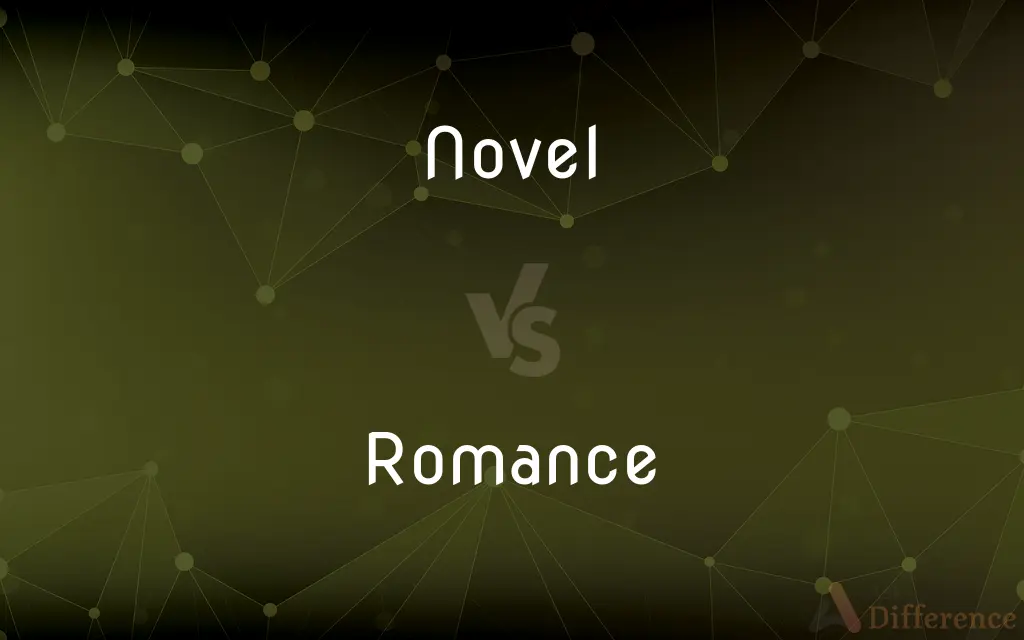Novel vs. Romance — What's the Difference?
By Maham Liaqat & Urooj Arif — Updated on March 1, 2024
A novel is a lengthy, fictional narrative that explores complex characters and plots, while a romance focuses on love and relationships, often with an optimistic ending.

Difference Between Novel and Romance
Table of Contents
ADVERTISEMENT
Key Differences
Novels encompass a broad range of genres and themes, offering deep explorations of characters, settings, and plots. They can vary greatly in style, structure, and subject matter, providing a wide spectrum of literary experiences. On the other hand, romance novels are a specific genre within fiction, dedicated to developing a narrative around romantic relationships between characters, typically leading to emotionally satisfying and optimistic conclusions.
Novels can be set in any time or place, and often delve into complex themes such as identity, morality, and society, romances usually center on the emotional journey of love between the protagonists, set against various backdrops that enhance the romantic narrative. Romance novels often adhere to formulas that prioritize the development and resolution of romantic conflicts.
Novels are known for their potential to explore various subplots and a wide cast of characters, enriching the main storyline with depth and complexity. In contrast, romance stories often focus more narrowly on the relationship between two main characters, with subplots and secondary characters serving to further the central love story.
The audience for novels is diverse, reflecting the wide range of genres and themes novels cover. Readers might seek intellectual stimulation, entertainment, or insight into the human condition. Conversely, the primary audience for romance novels seeks escapism, emotional engagement, and the pleasure of a guaranteed "happily ever after."
Narrative techniques in novels vary widely, allowing authors to experiment with point of view, narrative structure, and style. Romances, while also employing various narrative techniques, often emphasize emotional depth and character development, particularly from the perspective of the lovers, to engage the reader's empathy and investment in the romantic outcome.
ADVERTISEMENT
Comparison Chart
Primary Focus
Broad exploration of themes, characters, and plots.
Development of romantic relationships.
Genre Variability
Encompasses multiple genres.
Primarily focused on the romance genre.
Plot Complexity
Can include multiple complex subplots and themes.
Often centers on the romantic plot with fewer subplots.
Character Development
Deep exploration of a wide range of characters.
Focuses mainly on the development of the romantic leads.
Audience
Diverse, seeking various forms of literary experience.
Primarily seeks emotional engagement and escapism.
Ending
Varies widely, not restricted to happy endings.
Typically guarantees a "happily ever after" conclusion.
Setting and Time Frame
Any setting and time frame; not restricted.
Often idealized settings; time frame varies.
Emotional Engagement
Varies according to the novel's genre and themes.
High, with a focus on romantic love and emotional payoff.
Narrative Techniques
Diverse, with no specific requirements.
Often focuses on emotional depth and character perspective.
Compare with Definitions
Novel
Offers a wide range of literary styles.
The novel was celebrated for its innovative narrative structure.
Romance
A genre focusing on love and romantic relationships.
The romance novel ended with the couple's reunion.
Novel
Can encompass any genre or theme.
The science fiction novel presented a dystopian future.
Romance
Can be set in various backdrops to enhance the love story.
The historical romance was set in Victorian England.
Novel
A lengthy work of fiction with complex characters and plot.
The novel explored the complexities of human nature through its intricate storyline.
Romance
Targets readers seeking emotional engagement and escapism.
The romance novel provided the perfect escape with its engaging love story.
Novel
Focuses on character development and plot.
The novel's protagonist evolved significantly from start to finish.
Romance
Often features a happily ever after.
Readers love the romance for its guaranteed happy ending.
Novel
Not restricted to any specific ending.
The novel's ambiguous ending left readers pondering.
Romance
Centers on emotional depth and connection.
The romance delved deep into the emotional journey of its protagonists.
Novel
A novel is a relatively long work of narrative fiction, typically written in prose and published as a book. The present English word for a long work of prose fiction derives from the Italian: novella for "new", "news", or "short story of something new", itself from the Latin: novella, a singular noun use of the neuter plural of novellus, diminutive of novus, meaning "new".Some novelists, including Nathaniel Hawthorne, Herman Melville, Ann Radcliffe, John Cowper Powys, preferred the term "romance" to describe their novels.
Romance
A love affair
His romance with her lasted only a month.
Novel
A fictional prose narrative of considerable length, typically having a plot that is unfolded by the actions, speech, and thoughts of the characters.
Romance
Ardent emotional attachment or involvement between people; love
They kept the romance alive in their marriage for 35 years.
Novel
The literary genre represented by novels.
Romance
A strong, sometimes short-lived attachment, fascination, or enthusiasm for something
A childhood romance with the sea.
Novel
A fictitious tale or narrative, longer than a short story, having some degree of complexity and development of characters; it is usually organized as a time sequence of events, and is commonly intended to exhibit the operation of the passions, and often of love.
Romance
A mysterious or fascinating quality or appeal, as of something adventurous, heroic, or strangely beautiful
"These fine old guns often have a romance clinging to them" (Richard Jeffries).
Novel
A extended fictional work in prose; usually in the form of a story
Romance
A long fictitious tale of heroes and extraordinary or mysterious events, usually set in a distant time or place.
Novel
Pleasantly novel or different;
Common sense of a most refreshing sort
Romance
A story relating to chivalry; a story involving knights, heroes, adventures, quests, etc.
Romance
An intimate relationship between two people; a love affair.
Romance
A story or novel dealing with idealized love.
Romance
A relationship between two lovers
Romance
An exciting and mysterious quality (as of a heroic time or adventure)
Romance
The group of languages derived from Latin
Romance
A story dealing with love
Romance
Have a love affair with
Romance
Talk or behave amorously, without serious intentions;
The guys always try to chat up the new secretaries
My husband never flirts with other women
Romance
Tell romantic or exaggerated lies;
This author romanced his trip to an exotic country
Romance
Relating to languages derived from Latin;
Romance languages
Common Curiosities
How do novels and romances differ in audience appeal?
Novels appeal to a broad audience with diverse interests, while romances specifically target those looking for love stories with happy endings.
Can a novel be a romance?
Yes, a novel can be a romance if it primarily explores a romantic plot among its themes.
What is the significance of setting in romance novels?
The setting enhances the romantic narrative, providing a backdrop that complements the emotional journey.
What makes a novel's character development unique?
Novels often feature deep explorations of a wide range of characters, offering insights into their motivations, transformations, and complexities.
What is the main focus of a romance novel?
The main focus is on romantic relationships, often culminating in a satisfying and optimistic conclusion.
Do romance novels have complex plots?
Romance plots may have complexities, especially in subplots, but the main focus remains on the romantic relationship.
Is there a difference in the emotional engagement between novels and romances?
Romances specifically aim to evoke deep emotional engagement centered on romantic love, whereas novels' emotional engagement varies widely based on their themes.
What defines a novel?
A novel is a long, fictional narrative that delves into characters, settings, and plots with complexity and depth.
Can novels explore themes outside of love?
Absolutely, novels can explore a wide range of themes beyond love, including but not limited to morality, society, and identity.
How do narrative techniques vary between novels and romances?
Novels employ a wide range of narrative techniques, while romances often focus on techniques that enhance emotional depth and connection.
How important are subplots in a novel compared to a romance?
Subplots in novels can be crucial for adding depth and complexity, whereas in romances, they typically serve to support the central love story.
Are all romances happy endings?
While not a strict requirement, the genre typically promises a "happily ever after" or emotionally satisfying conclusion.
Why do people read romance novels?
People read romance novels for escapism, emotional engagement, and the pleasure of a guaranteed positive outcome.
Can the setting of a novel affect its narrative?
Yes, the setting can significantly influence a novel's atmosphere, themes, and character development.
What distinguishes the audience for novels from that for romances?
The novel's audience is diverse, seeking various forms of literary experience, while the romance audience specifically seeks stories of love and emotional fulfillment.
Share Your Discovery

Previous Comparison
Djellaba vs. Kaftan
Next Comparison
Cop vs. SpiderAuthor Spotlight
Written by
Maham LiaqatCo-written by
Urooj ArifUrooj is a skilled content writer at Ask Difference, known for her exceptional ability to simplify complex topics into engaging and informative content. With a passion for research and a flair for clear, concise writing, she consistently delivers articles that resonate with our diverse audience.














































